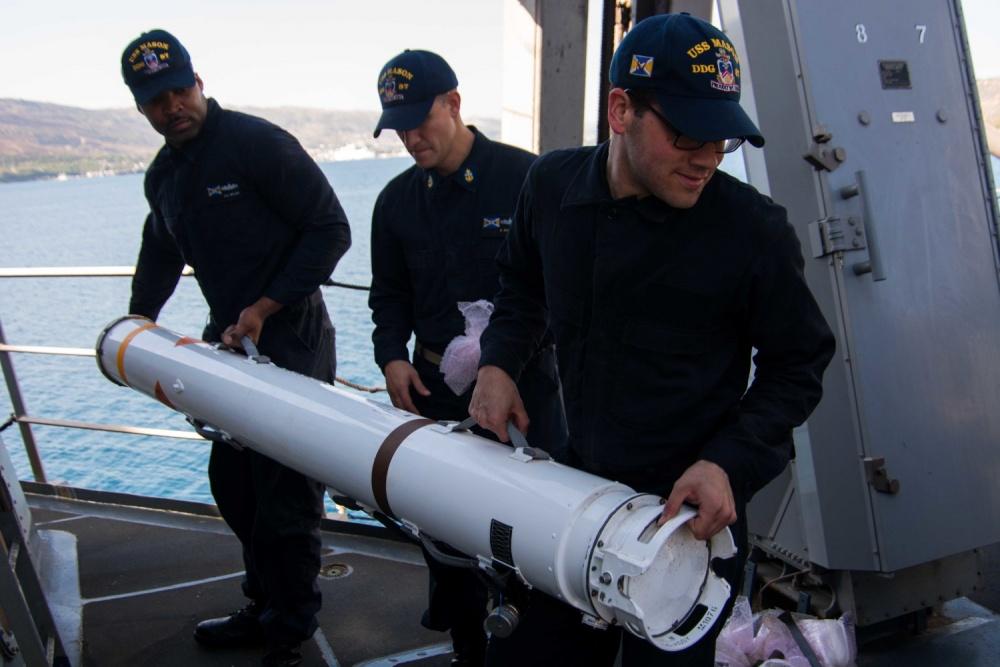
When three American warships and a merchant vessel were attacked by cruise missiles off the coast of Yemen in 2016, their crews fired off a series of defensive systems which diverted some of the missiles and brought the others down.
One of those systems, and key elements of another, were developed in Australia by scientists and engineers who are producing some of the world’s most advanced targeting devices.
The Nulka decoy system is Australia’s most successful defence export with more than $1 billion worth of sales to close allies. It’s been in operation with the Royal Australian Navy and the US Navy for over 20 years.
The Nulka is a rocket packed with electronics that is fired by a ship under missile attack. It hovers in the path of the incoming missiles and emits signals that simulate a radar return from a large ship overlapping the target vessel. Once the incoming missile locks on to what it thinks is a more attractive target, the Nulka moves the ghost image away from the real ship and the missile follows it into empty space.
The decoy was developed by Australian scientists from the Defence Science and Technology Organisation (now DST Group) with the high-tech company BAE Systems Australia. The Nulka forms one layer of the complex defence systems fitted to more than 150 Australian, US and Canadian warships.
It’s likely that the crew of at least one of the four US ships attacked by rebels off Yemen in October 2016 were saved from death or injury by the world-beating Nulka. The guided missile destroyer USS Mason was operating in the Red Sea about 12 nautical miles from the coast when it was fired on by Houthi rebels using land-based anti-ship cruise missiles.
The Mason’s crew fired their anti-missile systems, which included three of their own missiles and Australian-made Nulka decoys. The incoming missiles crashed into the sea.
At the time, very little detail was made public.
But now the US publication Navy Times has confirmed that the crews of four American naval vessels received combat action ribbons after a series of cruise missile attacks over several days. It says the Mason was with USS Ponce, an amphibious transport dock, when they were fired on. The Mason’s crew fired off two Standard Missile-2s, one Evolved Sea Sparrow missile and two ‘decoys’.
Several days later, five cruise missiles were fired at the Mason and the destroyer USS Nitz. Again, the ships fired missiles and decoys to bring down all five. The photograph with the Navy Times story shows US sailors reloading the Nulka system.
Australian scientists from a BAE Systems facility in Melbourne also played a key role in developing the control and guidance systems for the Evolved Sea Sparrow, a US missile made by Raytheon which is part of a NATO development program.
Brad Yelland, BAE Systems’ engineering director, says Australia produces the world’s best guidance and control technology using a combination of high physics and mathematics capability combined with proper understanding of how systems work, what they’re needed for, what they’ll do and how they’ll function in the environment they’re destined for. ‘My experience is that Australia is much more capable than most countries in the world, the Western world anyway, of truly applying systems thinking to things.’ The Australian-designed CEA phased-array radar system and the JORN over-horizon radar system are more examples of Australian achievements in the same broad area.
‘We have a level of knowledge and capability in this country that is not recognised’, Yelland says. ‘It’s not just Nulka, it’s the whole capability that enabled the development of Nulka. When you look at the core technical capability that underpins Nulka, it’s all around autonomous guidance and control. We’ve taken the Nulka capability and grown it into traditional missile guidance and control.’
In that way, the guidance and control system for both the Evolved Sea Sparrow and the British Taranis stealthy unmanned combat aircraft came out of the Melbourne office of BAE Australia.
He says that while engineers with much greater resources in places like the US throw money at a problem until it goes away, Australians are inclined to take a step back and find an alternative path to a solution. ‘That’s the advantage Australia has. It’s been forced on us because there are very few projects and not much money.’
Engineers in bigger, richer countries tend to focus on one aspect of a project. ‘Young engineers in Australia are likely to find themselves working in the mechanical space, the electrical space, software development, simulation and modelling’, says Yelland. ‘And so you start to build up this full knowledge of the system. It only when you’ve got that that you can really do these niche areas properly.
‘And it’s that fundamental difference that allows us to do these special things where you need to think outside the box, think laterally and understand the whole system.’